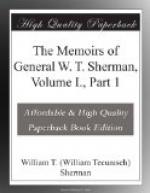which were as good as gold, and only required about
ten days to be paid in coin by the United States Mint.
I then rode up to Hammond’s house, on Rincon
Hill, and found him there. I explained to him
exactly Smiley’s affairs, and only asked him
to pay one of his acceptances. He inquired,
“Why not both?” I answered that was so
much the better; it would put me under still greater
obligations. He then agreed to meet me at our
bank at 10 P.M. I sent word to others that I
demanded them to pay what they could on their paper,
and then returned to the bank, to meet Hammond.
In due time, he came down with Palmer (of Palmer,
Cook & Co.), and there he met Smiley, who was, of
course, very anxious to retire his notes. We
there discussed the matter fully, when Hammond said,
“Sherman, give me up my two acceptances, and
I will substitute therefor my check of forty thousand
dollars,” with “the distinct understanding
that, if the money is not needed by you, it shall
be returned to me, and the transaction then to remain
statu quo.” To this there was a general
assent. Nisbet handed him his two acceptances,
and he handed me his check, signed as collector of
the port, on Major J. R. Snyder, United States Treasurer,
for forty thousand dollars. I afterward rode
out, that night, to Major Snyder’s house on North
Beach, saw him, and he agreed to meet me at 8 a.m.
next day, at the United States Mint, and to pay the
check, so that I could have the money before the bank
opened. The next morning, as agreed on, we met,
and he paid me the check in two sealed bags of gold-coin,
each marked twenty thousand dollars, which I had carried
to the bank, but never opened them, or even broke
the seals.
That morning our bank opened as usual, but there was
no appearance of a continuation of the “run;”
on the contrary, money began to come back on deposit,
so that by night we had a considerable increase, and
this went on from day to day, till nearly the old
condition of things returned. After about three
days, finding I had no use for the money obtained
on Hammond’s check, I took the identical two
bags back to the cashier of the Custom-House, and
recovered the two acceptances which had been surrendered
as described; and Smiley’s two notes were afterward
paid in their due course, out of the cash received
on those identical acceptances. But, years afterward,
on settling with Hammond for the Custom-House contract
when completed, there was a difference, and Smiley
sued Lucas, Turner & Co. for money had and received
for his benefit, being the identical forty thousand
dollars herein explained, but he lost his case.
Hammond, too, was afterward removed from office,
and indicted in part for this transaction. He
was tried before the United States Circuit Court,
Judge McAlister presiding, for a violation of the
sub-Treasury Act, but was acquitted. Our bank,
having thus passed so well through the crisis, took
at once a first rank; but these bank failures had
caused so many mercantile losses, and had led to such
an utter downfall in the value of real estate, that
everybody lost more or less money by bad debts, by
depreciation of stocks and collaterals, that became
unsalable, if not worthless.




